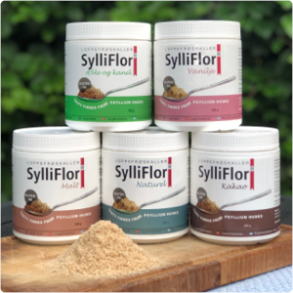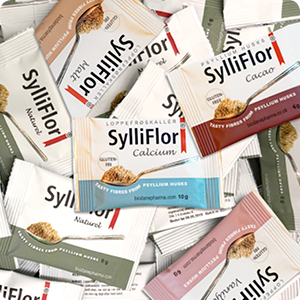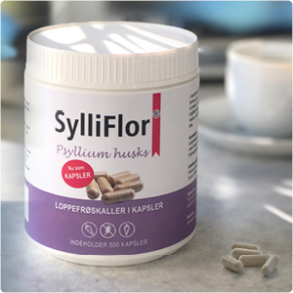
Psyllium husks
Psyllium husks have a high content of dietary fibres which help to stabilize and regulate the digestion, stabilize blood sugar and support beneficial bacteria in the gut. We have a unique variant:
SylliFlor® - crunchy and tasty psyllium husks that do not get sticky in your mouth. What sets us apart? Our husks are coated!
Psyllium products turn into a gel-like mass when they come in contact with water. Our psyllium husk product SylliFlor stands out from the rest. It has unique properties such as:
- Crispy Texture: Unlike ordinary psyllium husks and without any unpleasant stickiness.
- Taste Sensation: Our psyllium husks are not only functional but also tasty. They add a subtle flavour to your breakfast, snack or salad.



Psyllium husks add fibres
Psyllium husks are the small delicate husks around the seeds on the psyllium plant (Plantago ovata) also known as Ispaghula. The plant is native to northwestern India where the majority of the global production is still found today.
Psyllium husks are one of the most recommended food products for everyday fibre supplementation. They contain 85% dietary fibre (soluble and insoluble) which makes them one of the most fibre-rich plant parts known today.
Dietary fibres are known for their ability to regulate and support the digestion and promote the growth of beneficial bacteria in the colon. In other words, these fibre-rich husks make a great contribution to a healthy digestion.
Dietary fibres for digestion
Dietary fibre helps to regulate the digestion. It can absorb s is caused by their ability to absorb large amounts of liquid in the gut. Due to their very high content of dietary fibres, psyllium husks can bind up to 40 times their weight in liquid. For this reason, psyllium husks are recommended for people who want help to stabilize their digestion or increase their fibre intake.
Psyllium husks absorb water in the gut, which increases the volume and moisture of the stool. The size of the increased stool stimulates the gut movements (the peristalsis) and transportation of the mass through the gut is easier. The end product is bigger and easier-to- pass stool.
Normal transit time in the gut is 12-42 hours, but a diet rich on dietary fibres increases the speed and thus lowers the transit time. It all contributes to regular – and more comfortable – visits to the toilet.
The slimy, soft mass also stabilizes the digestion and minimizes the risk of both a loose and a hard stomach. The fibres in psyllium husks suck up the excess liquid in the gut in people with a loose stomach making the gut contents more solid. In addition, any hard lumps stuck in the gut (constipation) are encapsulated in the slimy mass, which eases further transportation.
Dietary fibres for the gut bacteria
An important feature of dietary fibres is the lack of degradation by the enzymes found in the human gastrointestinal tract. Thus dietary fibres arrive almost undigested in the colon where they are fermented and digested by the gut bacteria, the microflora, that simply lives on fibre.
Luckily, the bacteria most dependent on dietary fibres as food source are the so-called ‘beneficial’ bacteria. This group includes e.g. bifidobacteria and some lactic acid bacteria. Thus, a higher content of dietary fibre in the food increases the amount of beneficial bacteria in the gut. At the expense of the non-beneficial bacteria. During the fermentation of the fibres, the bacteria create several nutrients that are absorbed over the gut and used in the rest of the human body.
Recent studies have shown that the microflora in the gut is closely connected to the general state of the human body, but a deeper understanding is still lacking. However, much evidence indicates that gut bacteria can influence health, mood and weight. It is thus utterly important to take care of the gut microflora, and the best way to do so is to eat enough dietary fibre every day, e.g. psyllium husks.
Psyllium husks -Boosting satiety
Psyllium husks increase feelings of fullness. This is due to the high amount of dietary fibres and their water-absorbing feature. When the husks absorb liquid they swell and become a viscous mass providing a feeling of fullness.
The official nutritional advice on dietary fibres
The British Nutrition Foundation recommends that an adult’s daily intake of dietary fibres should be 30 g (read more on: https://www.nutrition.org.uk/healthyliving/basics/fibre.html), but on average the British people consume much less – about 18 g per day.
It is important to have a daily fibre intake that meets ones needs. If there are difficulties in getting enough fibres through the daily meals, it is efficient to use diet supplements with a high content of fibres, e.g. psyllium husks.
Psyllium husks for everyone
Psyllium husks are gluten-free and may thus be consumed by everyone with a troubled stomach or with the wish to increase the intake of dietary fibres. No matter whether you are flexitarian, vegetarian, vegan, on the FODMAP diet or something else. In addition, psyllium husks contain practically no carbohydrates and do not affect the blood sugar levels.
Psyllium husks from Biodane Pharma
We market a very special variant of psyllium husks: SylliFlor®. Our psyllium husks are unique offering a lovely taste and crispy texture compared to other psyllium husk products. SylliFlor is entirely without the usual taste-related inconveniences associated with psyllium husk consumption. This is attributed to the crispy texture resulting in a pleasing fibre without any stickiness.
Always remember to drink plenty of water or other fluids when taking psyllium husks.
SylliFlor® is patented
SylliFlor® is a registered trademark








